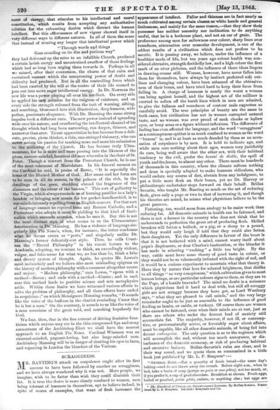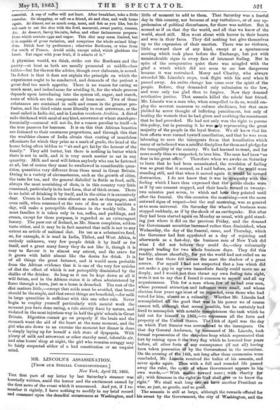SCRAGGINESS.
BANTLNG'S attack on corpulence ought after its first success to have been followed by another on scragginess, and we have always wondered why it was not. More people, we imagine, wish to be fatter than wish they could diminish their fat. It is true the desire is more closely confined to women, men being tolerant of leanness in themselves, apt to believe indeed, in spite of scores of examples, that want of flesh increases the
appearance of intellect. Pallor and thinness are in fact nearly as much cultivated among certain classes as white hands and general listlessness, and mainly for the same reason,—that they show their possessor has neither necessity nor inclination to do anything useful, that he is a hothouse plant, and not an ear of grain. The preference among men for sallowness over colour, sharp lines over roundness, attenuation over muscular development, is one of the oddest results of a civilization which does not profess to be ascetic. It is passing away, we believe, under the influence of a healthier mode of life, but ten years ago robust health was, con- sidered obtrusive, strength decidedly low, and a high colour the first mark of an utter plebeian, and the influence of those ideas lingers in drawing-rooms still. Women, however, have never fallen into them for themselves, have always by instinct preferred soft out- lines and changing colour, have been ashamed of the obtrusive- ness of their bones, and have tried hard to keep their faces from falling in. A charge of leanness is nearly the worst a woman can bring against herself, and the highest art of the milliner is exerted to soften off the harsh lines which in men are admired, to give the fullness and roundness of contour male cuquettes so carefully avoid. The true principles of beauty are the same in both cases, but civilization has not in women corrupted natural taste, and no woman was ever proud of sunk cheeks or h2llow eyes, or bony arms or a figure without inflexions. The difference of feeling has even affected the language, and the word "scragginess" as a contemptuous epithet is as much confined to women as the word "buxom" is, and is at least as much dreaded by them as an accu- sation of corpulence is by men. It is held to indicate age, and while men care nothing about their ages, women very justifiably do care, being well aware that the other sex, with their habitual tendency to the evil, prefer the beanie de diable, the spell of youth and freahness, to almost any other. There must be hundreds of thousands in this country, where the climate softens nothing and dress is specially adapted to make leanness ridiculous, who would endure any course of diet, abstain from any indulgence, to put a little more flesh on their bones, yet no Dr. Harvey or philanthropic undertaker steps forward on their behalf. Biillat Savarin, who taught Mr. Beating so much on the art of reducing flesh, gives only a page or two to that of increasing it, and though his theories are sound, he misses what physicians believe to be the great panacea.
Fattening, too, would seem from analogy to be easier work than reducing fat. All domestic animals in health can be fattened, and there is not a farmer in the country who does not think that he understands to perfection the great art of producing flesh. Skilled breeders will fatten a bullock, or a pig, or a sheep to a pound, but they would only laugh if told that they could also fatten their daughters. Yet the only difference in favour of the beast is that it is not bothered with a mind, cannot worry itself about papa's displeasure, or dear Charles's inattention, or the blunder it has made in selecting " ruching " a little too bright. By the way, cattle must have some theory of good taste in colour, or they would not be so vehemently irritated with the sight of red, and it would be a curious experiment to ascertain what that theory is. Have they by nature that love for sobered brightness, that dislike to all things "so very conspicuous," which cultivation gives to most human beings, or are particular colours signs to them, as they are to the Pope, of a hostile bravado? The mind no doubt is a nuisance which physicians find it hard to deal with, but still all scraggy girls are not scraggy because they have got, as Lord Westbury says, "what they are pleased to call minds," and the very large remainder ought to be just as amenable to the influence of good feeding as lambs, or cattle, or turkeys. Of course there are women who cannot be fattened, even when their minds are at rest, just as there are others who under the fiercest load of anxiety still accumulate fat. The majority, however, if not ill, or consump- tive, or preternaturally active, or feverishly eager about affairs, must be capable, like all other domestic animals, of being fed into decent embonpoint. The only question is as to the regimen which will accomplish the end, without too much annoyance, or dis- turbance of the domestic economy, or risk of producing habitual and excessive laziness. Brillat-Savarin's rules are clear, and in their way sound, and we quote them as summarized in a little book just published by Mr. L. F. Simpson* :— " GENERAL BULL—Eat a quantity of fresh bread—the same day's baking—and do not throw away the crumb. Before eight a.m., when in bed, take a basin of soup (pelage an pain or aux pates), not too much, or, if you prefer it, a cup of good chocolate. Breakfast at eleven. Fresh eggs, boiled or poached, petits patis, cutlets, or anything else ; but eggs are
• Tin Handbook of Dining; or. Corpulencyand Leanness. By BrillaSSITarin. Trans- lated by L. C. Simpson. Loudon: Longman and Co.
essential. A cup of coffee will not hurt Alter breakfast, take a little exercise. Go shopping, or call on a friend, sit and chat, and walk home again. At dinner, eat as much soup, meat, and fish as you like, but do not omit to eat the rice with the fowl, macaroni, sweet pastry, creams, de. At dessert, Savoy, biscuits, babas, and other farinaceous prepara- tions which contain eggs and sugar. This diet may seem limited, but it is capable of great variation, and comprises the whole animal king- dom. Drink beer by preference ; otherwise Bordeaux, or wine from the south of France. Avoid acids, except salad, which gladdens the heart. Eat sugar with your fruit, if it admits of it."
A physician would, we think, strike out the Bordeaux and the pastry—at least as both are usually presented at middle-class tables—but for thereat the advice, though over elaborate, is sound. Its defect is that it does not explain the principle on which the experiment ought to be conducted, and demands of the patient a great deal too much appetite. There is no reason for eating so much meat, and indeed some for avoiding it, for the whole process depends upon introducing into the system oil, sugar, and starch, none of which are the components of lean meat. Two of those substances are contained in milk and cream in the greatest pro- fusion, and the third exists most liberally in real arrowroot, or the meal called in India dal, and in London revels eta Arabica. A dietof roils thickened with meal of anykind, arrowroot or wheat starch pre- ferentially—oatmeal will not do, for a reason peculiar to itself —is the true panacea for leanness. It is on this that African beauties are fattened to their enormous proportions, and through this that the wealthier classes of India obtain that coating of muscleless effeminate fat which they prize as a mark of grade, the head of the house being often bidden to "Sit and get fat for the honour of the family." They add butter, but there is nothing in butter which there is not in milk, and it is very much nastier to eat in any quantity. Milk and meal will fatten anybody who can be fattened at all, but of course they must be swallowed in considerable quan- tities, quantities very different from those usual in Great Britain. Owing to a variety of circumstances, such as the growth of cities, the taste for tea, and the general disbelief in fluids as food, milk, always the most nourishing of diets, is in this country very little consumed, particularly in its best form, that of thick cream. There is no habit of drinking it by itself, and in the cities it is excessively dear. Cream in London costa almost as much as champagne, and even milk, when consumed at the rate of five or six tumblers a day, will make a perceptible difference in the weekly bills. In most families it is taken only in tea, coffee, and puddings, and cream, except for those purposes, is regarded as an extravagant luxury. The poor out of Ireland, as Mr. Simon complains, seldom taste either, and it may be in fact asserted that milk is not to any extent an article of national diet. Its use as a substantive food, as, for example, it is used in India, Thibet, and West Africa, is entirely unknown, very few people drink it by itself or for itself, and a great many fancy they do not like it, though it is easy to flavour it to almost any extent, and the crave for it grows with habit almost like the desire for drink. It is of all things the great fattener, and it would seem probable from the African evidence that it is one of the very few articles of diet the effect of which is not perceptibly diminished by the .dialike of the drinker. So long aa it can be kept down at all it 'will fatten, and in the African states it is often administered by force through a horn, just as a horse is drenched. The rest of the -diet matters little,—except that acids must be avoided, that bread .should be the staple, and that sweet things are beneficial,—for milk in large quantities is sufficient with this one other rule. Never begin to employ, yourself particularly with mental work the moment you have done eating, a rule strictly fixed by nature, and 'violated in the most injurious way in half the girls' schools in Great Britain. Digestion cannot go on properly if the brain and the stomach want the aid of the heart at the same moment, and the _girl who sits down to an exercise the moment her dinner is done is simply laying up for herself a rich store of dyspepsia. With plenty of milk and arrowroot or other starchy meal, tolerable air, .and nine hours' sleep at night, the girl who remains scraggy may be fairly suspected either of a bad constitution or an unquiet mind.































 Previous page
Previous page